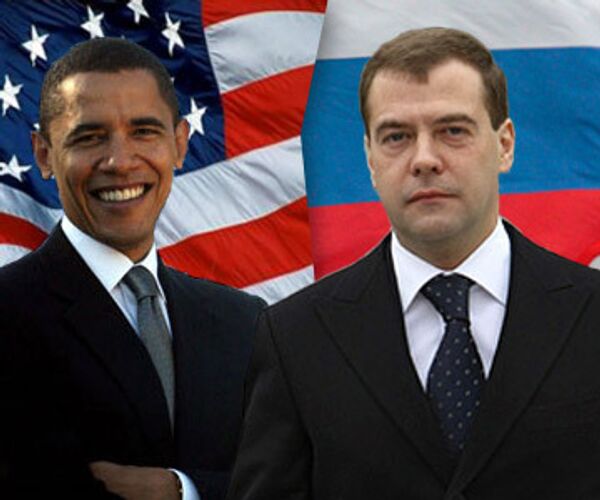U.S. Congress has passed Barack Obama's healthcare reform bill that will give Americans more control over their health care by holding insurance companies more accountable. It seems now is the time for big foreign policy moves.
The U.S. President intends to start with nuclear arms. Washington and Moscow say their new START treaty is ready for signing. According to American analysts, it will most probably be signed on April 5 in Prague, while Russian sources think it will happen three days later. The actual date will be announced soon.
Russia and the United States still differ on the document's readiness. Americans say that Barack Obama and Dmitry Medvedev still need to discuss their differences over the next few days, but that they are not insurmountable.
President Obama's meeting with Senator John Kerry, chairman of the Senate Foreign Relations Committee, and Senator Richard Lugar, its ranking Republican, on March 24 as part of ongoing consultations with Congress on the START treaty is evidence that progress has been made.
Under the American Constitution, all international treaties signed by the president need Senate approval to become effective. Presidents usually try to establish in advance whether there is likely to be any problem with ratification.
The Senate is to begin START hearings on April 4, before the two presidents sign the treaty, but this is not a sure sign of an easy passage. In addition to the Republicans, there are also treaty opponents among the Democrats, who have a majority in the Senate.
It means that Obama is trying to speed up his nuclear initiatives, so that the treaty is signed before the April 12 nonproliferation meeting in Washington. The outcome of the NPT Review Conference in May will depend on the Washington meeting and the signing of the START treaty, even though it will take several more months to ratify it.
According to a senior U.S. administration official, they "have talked to our Czech allies and the Russians about a signing in Prague when the treaty is finished."
"Prague is where the president delivered a speech outlining his arms control and nonproliferation vision last spring and where we always wanted to do a signing," he said.
In view of the Americans' love of symbolic gestures and the White House PR department's desire to add symbolism to the president's addresses, the signing should be expected on April 5, exactly a year since he committed the United States to seeking "a world without nuclear weapons" in Prague.
So, Prague April 5 could see Obama going from word to deed in his foreign policy, where he has recently not been too successful. One of his biggest flops was the Israeli Prime Minister Binyamin Netanyahu's visit to Washington. Their exchange at that meeting was so candid that the White House banned journalists from attending it, cancelled the planned news conference, and did not post the de rigueur photos taken in the Oval Office.
In short, the START treaty could save the day for Obama. But it will be a breakthrough document only compared to the previous treaty, and a half-opened door as regards everything else.
The 20-page treaty is to seal the sides' commitment to cut the number of nuclear warheads each possesses to between 1,500 and 1,675 within seven years, and the number of delivery vehicles for them to between 500 and 1,100.
Back in 2002, presidents George Bush and Vladimir Putin signed the Treaty on Strategic Offensive Reductions (SORT) to limit their nuclear arsenals by 2012 to 1,700-2,200 operationally deployed warheads each. Not so very different from the new agreement being prepared for signing.
Analysts agree that the new START treaty should be an appetizer before a main course. If it fails at that, the victory of its achievement will not be significant, since the cutbacks have been kept to a minimum. In fact, the new START treaty is so moderate that the sides are only optimistic because it holds the promise of further work.
"The two sides share a common goal to pursue further nuclear arms cuts. A common path has not yet been established," said Daryl Kimball, the head of the Arms Control Association in Washington.
Perhaps they will do so in Prague.
I would advise reading the treaty provisions carefully and listening closely to what the two presidents will say in the Czech capital when signing the treaty. In general, Prague, and Eastern Europe in general, is a good place to look for a connection in the agreement between strategic arms control and the ballistic missile shield.
The opinions expressed in this article are the author's and do not necessarily represent those of RIA Novosti.
MOSCOW. (RIA Novosti political commentator Andrei Fedyashin)



